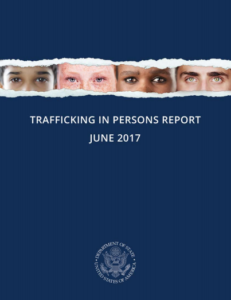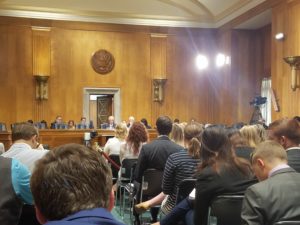By: Alisa Bernard, Survivor Advocacy Coordinator, The Organization for Prostitution Survivors
I am of the technology generation. I was born the same year the cell phone was invented and Macintosh Apple made its debut. I never knew a time when a computer was not an accessible tool. We live in a time where computers the size of a credit cards can stream a giraffe giving birth across the country and can teach us how to do anything from play the violin to fix a leaky drain. The possibilities are limitless. But what happens when those possibilities are twisted into something darker? What happens when we use our innovations to trade in the flesh of young girls?
[easy-tweet tweet=”What happens when we use our innovations to trade in the flesh of young girls? – Alisa Bernard” user=”SharedHope”]
The online sex trade is not new. When I was prostituted over a decade ago, I was sold online. Online prostitution is not glamorous and it is not safer than street prostitution. The violence endemic to prostitution is not somehow mitigated by the internet. One study stated that violence is perpetrated predominantly by buyers regardless of venue of solicitation. The internet has normalized the buying of sex down to a negligible transaction. Women and girls are being reduced to mail order masturbation aids.
[easy-tweet tweet=”Online prostitution is not glamorous and it is not safer than street prostitution. – Alisa Bernard” user=”SharedHope”]
[easy-tweet tweet=”The violence endemic to prostitution is not somehow mitigated by the internet. – Alisa Bernard” user=”SharedHope”]
The Senate’s proposed reforms to section 230 of the Communications Decency Act would allow for the prosecution of criminal activity on the part of internet service providers for facilitating the online sex trade. Essentially, businesses like Backpage.com could be held accountable for their contributions to the online sex trade. This is an essential step forward in the fight against trafficking in the US. Opposition activists express concern that the sex trade marketplace would make trafficking somehow more hidden or move underground if the online market is eliminated through this act. In reality, a result of the now internet facilitated sex trade is the intentional disappearing of both victims and traffickers. Backpage.com’s business model assists traffickers in obfuscating information in their ads, keeping them hidden behind bitcoins. Photos of children for sale across Backpage.com and similar sites have had their meta-data scrubbed away. Identification of victims and perpetrators has become practically impossible. How much more hidden could the market be?
According to the National Center for Missing and Exploited Children most cases of trafficking occur online and the majority of those are happening through Backpage.com. At first, I thought Backpage.com was simply ignoring the experiences of women and girls like me by populating their site with these ads. Backpage.com isn’t ignorant that we are being bought and sold on their website, they want us to be bought and sold on their website. Every ad costs a price and with hundreds of ads posted daily they won’t say no to such a profit margin. Never mind if most of the product is young girls and women so long as the profits keep rolling in. And why not if they can hide behind a bastardization of free speech laws.
The thousands of women and girls whose faces have glared across a Backpage.com moderator/editor’s screens are not products. Editing an ad for a child doesn’t change the facts. She’s 14 with a pimp, or 23 and her pimp’s name is poverty, editing doesn’t make that 14-year-old 18, and it doesn’t change the 23-year-old’s circumstances. It does, however, add another few dollars into the Backpage.com bank account. So yeah, I care that there are more stringent requirements to post a car for sale than there are to post a young girls body.
Do the rapes of innocent women and girls mean so little? Have we accidently put the freedom to facilitate the rape of girls above girl’s freedom to be safe from rape? Reform is needed. The changes proposed to the CDA do not allow for the mass hysteria the tech industry would have you believe. The changes in the language do not allow for overzealous trial attorneys to go suing innocent internet service providers. If they are doing nothing wrong, they have nothing to fear. If they are using the CDA as a cover to hide their own perpetuation of the sex trade then, yes… they should have much to fear.
[easy-tweet tweet=”If (tech companies) are doing nothing wrong, they have nothing to fear (from amending the CDA). ” user=”SharedHope”]
I am firmly for the protection of the First Amendment and believe that it is one of the most integral core tenets of any free society. However, using the CDA as a smoke screen to conceal trafficking is just as much an attack on free speech as stripping the First Amendment bare. The modern era is rife with technological advancement, and we must update our laws to reflect this ever changing landscape.
I stand in solidarity with those who work to reform section 230 of the CDA, and I beg you, from someone who has seen what the online sex trade really looks like, to mobilize around this issue. Get your voice out, get your opinion out, because our voices cannot be the only ones to stand up.
[easy-tweet tweet=”Get your voice out, get your opinion out, because our voices cannot be the only ones to stand up.”]
 Committee Chairman Bob Corker (R-TN) presided over the meeting. He was joined by Ranking Member Ben Cardin (D-MD), along with committee members Bob Menendez (D-NJ), Todd Young (R-IN), and Tim Kaine (D-VA). The Honorable John J. Sullivan, Deputy Secretary of State, and the Honorable Susan Coppedge, Ambassador-at-Large, Office to Monitor and Combat Trafficking in Persons represented the State Department as the hearing’s witnesses.
Committee Chairman Bob Corker (R-TN) presided over the meeting. He was joined by Ranking Member Ben Cardin (D-MD), along with committee members Bob Menendez (D-NJ), Todd Young (R-IN), and Tim Kaine (D-VA). The Honorable John J. Sullivan, Deputy Secretary of State, and the Honorable Susan Coppedge, Ambassador-at-Large, Office to Monitor and Combat Trafficking in Persons represented the State Department as the hearing’s witnesses.






